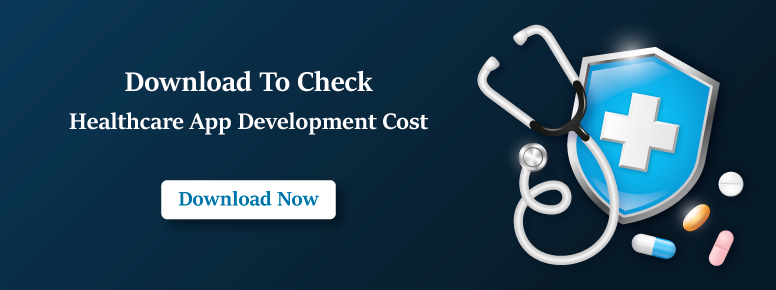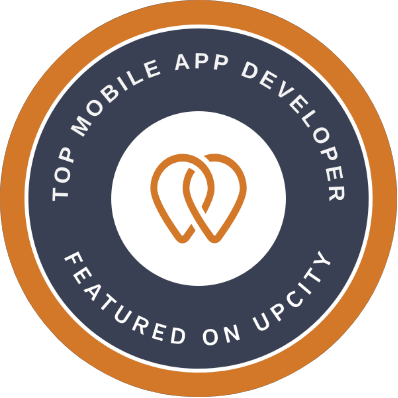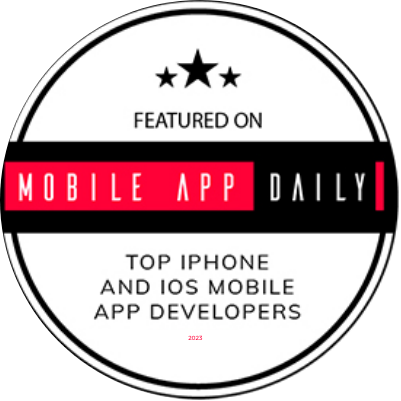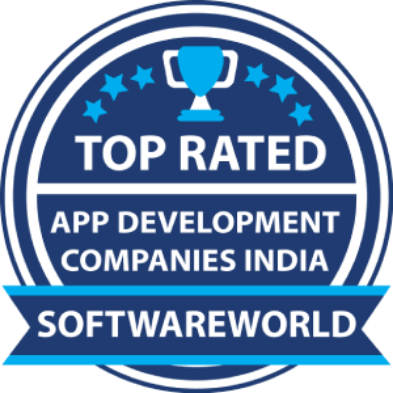Healthcare Mobile App Development is among the industries that have faced the least technological transformation up until now. This is because there are a lot of hurdles in implementing technology into healthcare operations. The recent advancement in Artificial Intelligence (AI) and Augmented Reality (AR) technologies could overhaul the way healthcare operations take place but unfortunately, most of the digitization efforts are delayed or failed because of strict regulatory compliance and patient data privacy requirements.
Current trends in Mobile Healthcare Solutions
Machine Learning is the Breakthrough
The continuous innovations in Machine learning (ML) technology is opening up new horizons for the healthcare industry. Technology experts and entrepreneurs are figuring out innovative ways to make extensive use of data science into healthcare technology solutions. Some industry verticals in healthcare such as pharmaceutical companies, clinics, etc. already have started to utilize machine learning.
The principle of ML is that you provide the ML algorithms with relevant information for its training. As you infuse more diversified data such as patient’s EKG results, heartbeats, BMI, etc, the system starts understanding more about the particular patient. The more diversified the data is the better the outcome would be.
Of course, the ML model would need retraining, but the success of it is heavily dependent on your data science and development team’s collaboration. A perfect ML system will provide users/patients with realistic health treatment forecasts. With more training, the system gets more accurate and can be a trusted method for treatment planning.
HIPAA and GDPR are Crucial
Every mHealth app which is meant to be operating worldwide would strictly need to meet HIPAA (Health Insurance Portability and Accountability Act) for the US and GDPR (General Data Protection Regulation) for the EU. These regulations protect patient’s sensitive data. It is advised to the healthcare technology service providers to take certain network, physical, and process security steps. Both the compliances require you to store and handle patient/user’s data carefully. Let’s dig deep into HIPAA and GDPR:
HIPAA
There are two types of classification for HIPAA:
1. HIPAA for Individuals
As the name suggests HIPAA for individuals empowers patients to have access to their medical information and the right to data privacy. This law is critical for health startups and they have to understand how to collect, store, or share any type of patient’s health records (called PHI, or Protected Health Information). PHI includes patient’s medical details, health insurance information, billing information, or any such data. The personnel who are responsible for handling such data are required to obtain a HIPAA awareness training certificate.
HIPAA for Organizations
This HIPAA category consists of compliances for the organizations. It protects the privacy and security of PHI that organizations access. To keep it short, if you deal with patient’s electronic data, which you probably do, the HIPAA for organizations certification will be a must for you.
2. GDPR
For organizations, GDPR has come as a blessing. Now, the users can share their sensitive information with businesses and organizations that abide by GDPR approved data protection processes, without any hesitation. GDPR covers all the data security aspects for the EU and EEA. There is no option for the organization such as ‘not abiding by GDPR’ because if they don’t abide, they’ll suffer huge penalties and fines. To know more about how to be GDPR compliant, click here.
 Essential to have offline mode
Essential to have offline mode
Every successful mobile healthcare solution will need to be able to work online as well as offline. The access to medical IoT devices or medical information should continue even if the customers have poor internet service, the mobile tower crashes, or the customer is on a flight without access to Wi-Fi.
Implementation challenges with mHealth Apps
Here we talk about the challenges faced by health-tech startups and enterprises while developing and implementing healthcare mobile applications:
Outdated and Complex Healthcare Infrastructure
No matter how beneficial the mHealth application seems for both doctors and patients, its implementation is a lot more challenging than it appears. Although mobile phones are omnipresent, with medical staff, patients, and their family commonly owning devices.Still, the mobile app adoption in the healthcare industry is very slow as compared to other industries.
This is because the healthcare IT infrastructure is already very complex having a multitude of systems, networks, applications, and devices. Integrating mobility will add a new layer of complexity to this traditional infrastructure. Many times, organizations find it challenging to implement healthcare mobile applications due to the system incompatibility or limited resources. In such cases, the mobile healthcare solutions may fail to deliver desired results of greater efficiency and operational transparency.
To overcome this issue, the Health solution providers must thoroughly examine the IT infrastructure in the implementation environment. The solution providers should aim to develop healthcare mobile applications that can be easily deployed to the existing IT environment.
Interoperability
Many healthcare organizations haven’t adopted mobile technology due to the lack of interoperability between existing healthcare systems and proposed mobile solutions. The term interoperability in Healthcare Mobile App Development refers to the ability of healthcare systems to communicate with each other and share medical data seamlessly in a secure environment.
Interoperability ensures the instant availability of electronic health record data that helps doctors, hospitals, and patients to make the right health decisions. The Healthcare Mobile App Development who are leveraging interoperability, found greater operational efficiencies and success in remote monitoring.
However, there are challenges with accessing the data as various departments work in silos and therefore it is hard to realize the interoperability. The solution providers are required to set up a cohesive digital healthcare ecosystem as the interoperability is the key to the success of a holistic healthcare model.
Data Security Risk
Data security is not just the regulatory compulsion but also an ethical issue. The healthcare organizations cannot afford to ignore the data security and when implementing mobile healthcare solutions, the risk of data breaches increase.
Mobile healthcare solutions are more prone to data theft as they exchange data over wireless networks. Just for an example, when doctors use their personal mobile device to share sensitive patient health data, it might leak in the absence of proper security measures. To eliminate the risk of data breaches, healthcare providers would need a fully interoperable healthcare ecosystem. To start with the enhanced security, the health-tech developers should:
- Set up firewalls and enable data encryption
- Formulate a robust BYOD (Bring Your Own Device) framework
- Ensure that mHealth and EHR systems are compliant to HIPAA and GDPR guidelines
- Establish a breach-proof mobile storage and retrieval system
- Design effective training plans for healthcare employees to convey the best practices to use the systems.
Failure in Patient Engagement
As the world is going mobile with each passing day, the patients are demanding more convenience from the healthcare service providers and the new set of expectations include mobile health systems. The sad truth is that only a few mHealth solutions retain the patient’s interest after on-boarding.
The patients want to drive the wheel by being an active part of their treatment plan. This motivates them and also helps them in making more informed health decisions. This is the reason patients want more transparency into their treatment process and the most efficient way to achieve this transparency is to adopt a fully-functional healthcare IT ecosystem.
To increase the patient engagement and interest in healthcare mobile applications, the solution provided should keep the patient interest in mind while creating the patient’s user flow and interfaces.
Unsatisfactory User Experience
Nowadays, it is essential to involve patients in their healthcare cycle. And since almost every individual owns a smartphone, mHealth has a great potential of adoption. Though the patients are ready to adopt mHealth applications, they are prone to quit if the app isn’t easy to use. It is challenging to deliver amazing user experience considering that every patient has unique health requirements. And another thing that makes the situation worse is that the patient may use the app on a variety of devices, i.e. tablets, smartphones, smartwatches, etc.
Now it is up to the mHealth app creators to create apps that are accurately responsive to all of the devices and at the same time, provide a personalized user experience. The two prime factors the developers need to keep in mind while designing and developing the mHealth app are to focus on patient education and user-experience.
Customization Required with Every Deployment
Not every Healthcare Mobile App Development is a right fit for every healthcare service provider. The healthcare organization can be different from the others in terms of operational processes, scales, network configurations, and level of security requirements. Hence, their expectations from the mHealth app will be different.
This is why, while designing the healthcare mobility strategy, mobile healthcare solution providers should opt for custom cloud-based environments. A custom cloud-based strategy will reduce the implementation complexities whilst ensuring seamless integration with the existing IT environment and reducing the implementation cost.
Solution Reliability
No matter how amazing the functionalities of the Healthcare Mobile App Development are, it can become futile if the reliability is compromised. There are a couple of issues that relate to reliability. First is the lack of proper synchronization between mobile and non-mobile systems that leads to dysfunctioning of the solution.
Second can be the non-efficient data ingestion and analysis methods. This is where the domain expertise of a mobile healthcare solution developer is required. Having non-processed information in the app won’t serve the purpose and the user may abandon the app.
In both the scenarios, the mobile healthcare solution providers should assess the app in terms of concept and technicality. Proving the accurate and meaningful information in the app will help users to rely on the app.
Data Management and IoT
IoT is the biggest trend among healthcare and fitness tracking apps. Every medical app can leverage the real-time patient health data for better medical treatment and a personalized app experience to the users. Feeding apps with real-time health data via IoMT devices enable AI-powered personalized health suggestions for the users.
While the data received from IoMT devices helps users with controlling cardio activities to managing diet plans, the management of data ingestion, storage, and analysis becomes complex. IoMT devices integration means that a lot of data will be collected every minute. Analysing this data to get meaningful insights from this is a challenging task.
To overcome this challenge, the mHealth app developers should seamlessly integrate the IoMT devices with the app and also can utilize third-party advanced data analysis services.

Final Words
It is certain that mobile health solutions are the next big thing for the healthcare industry. The technologies will transform the healthcare industry to bring improved visibility into operations and operational efficiency. The challenges stated in the articles are not impossible to address. With a well-thought technical architecture, creating an amazing mobile healthcare solution is a cakewalk.
The solution providers should put their focus on keeping the patient’s data secure, ensuring interoperability with existing IT infrastructure, and making the app user friendly. On top of all,, they should follow the guidelines set by regulatory authorities.
Once the provisions specified in this article are in place, your mHealth app will improvise your healthcare operations, by boosting your profits and improving patient/customer engagement. We at Nimble AppGenie are empowering healthcare service providers by providing them with secure, scalable, and reliable mobile health apps. Feel free to contact us here.

Niketan Sharma is the CTO of Nimble AppGenie, a prominent website and mobile app development company in the USA that is delivering excellence with a commitment to boosting business growth & maximizing customer satisfaction. He is a highly motivated individual who helps SMEs and startups grow in this dynamic market with the latest technology and innovation.
Table of Contents




 Essential to have offline mode
Essential to have offline mode








2 Comments
Comments are closed.